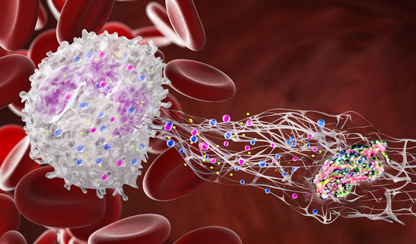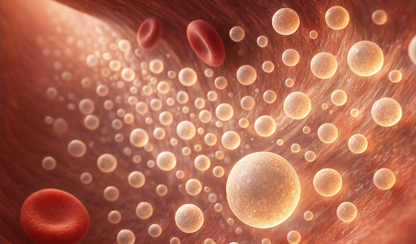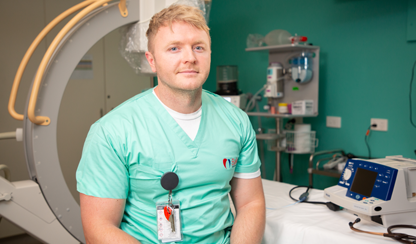23 August 2024
Media release

Researchers have uncovered how fluctuations in blood flow that occur when there is a narrowing in the arteries contribute to harmful inflammation and blood clot formation, revealing the critical role that blood flow-driven forces play in the development and progression of cardiovascular diseases.
These new insights from researchers at the Baker Heart and Diabetes Institute, published today in Nature Communications, have led to the identification of a target that could mitigate harmful inflammation and blood clot formation, and potentially have a significant impact on diseases including atherosclerosis and heart valve disease.
When there is a narrowing in blood vessels, blood flow fluctuates and a sequence of cellular events take place, including the activation of white blood cells — the body’s innate immune response.
However, the blood flow fluctuation (shear stress) also induces a process called NETosis, which sees white blood cells (neutrophils) release web-like structures that trap and neutralise harmful invaders like bacteria. This trapping and subsequent arterial build-up have been found to contribute to harmful inflammation and blood clot formation.
Baker Institute Head of the Mechanobiology and Microfluidics lab, Associate Professor Sara Baratchi, has identified that an ion channel called Piezo1 is crucial in the NETosis process, paving the way for the identification of protective treatments to prevent shear stress-induced arterial narrowing.
“Our research has identified that Piezo1 senses the stress that is caused by the blood flow fluctuations, which leads to calcium influx. This, in turn, triggers NETosis and the formation of these white blood cell traps, and the harmful inflammation and clot formation that follows,” she said.
“Targeting the Piezo1 ion channel could be a promising therapeutic strategy to mitigate the harmful inflammation and clot formation, which would mean significant potential benefits for public health.”
Atherosclerosis is a narrowing of the arteries caused by a buildup of fats, cholesterol and other substances in and on the artery walls and is the underlying cause of about 50 per cent of all deaths in westernised society. It can lead to stroke, heart attacks, dementia, and other health issues.
“Blood flow-driven forces, like shear stress, play a critical role in the development and progression of various cardiovascular diseases, including atherosclerosis and heart valve disease,’ Sara said.
“Understanding the effect of shear stress in areas where blood vessels or heart valves are narrowed because of the immune cells is crucial in the context of cardiovascular disease, as it offers significant insights into the mechanisms that drive disease progression and complications.
“With these findings, we’re now a step closer to identifying protective treatments that can prevent this harmful clotting that is induced by the NETosis process.”
For further information or to organise interviews please contact:
Tracey Ellis
T: 03 8532 1514
M: 0433 781 972
E: tracey.ellis@baker.edu.au





